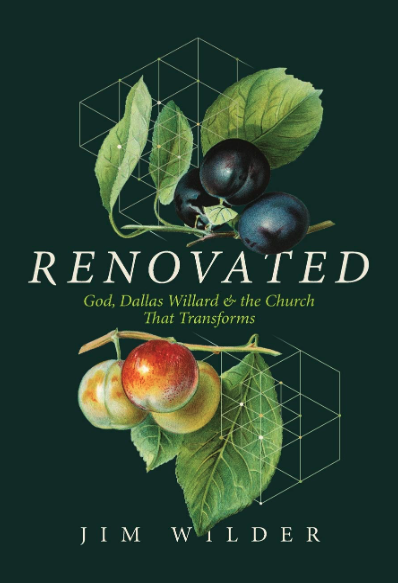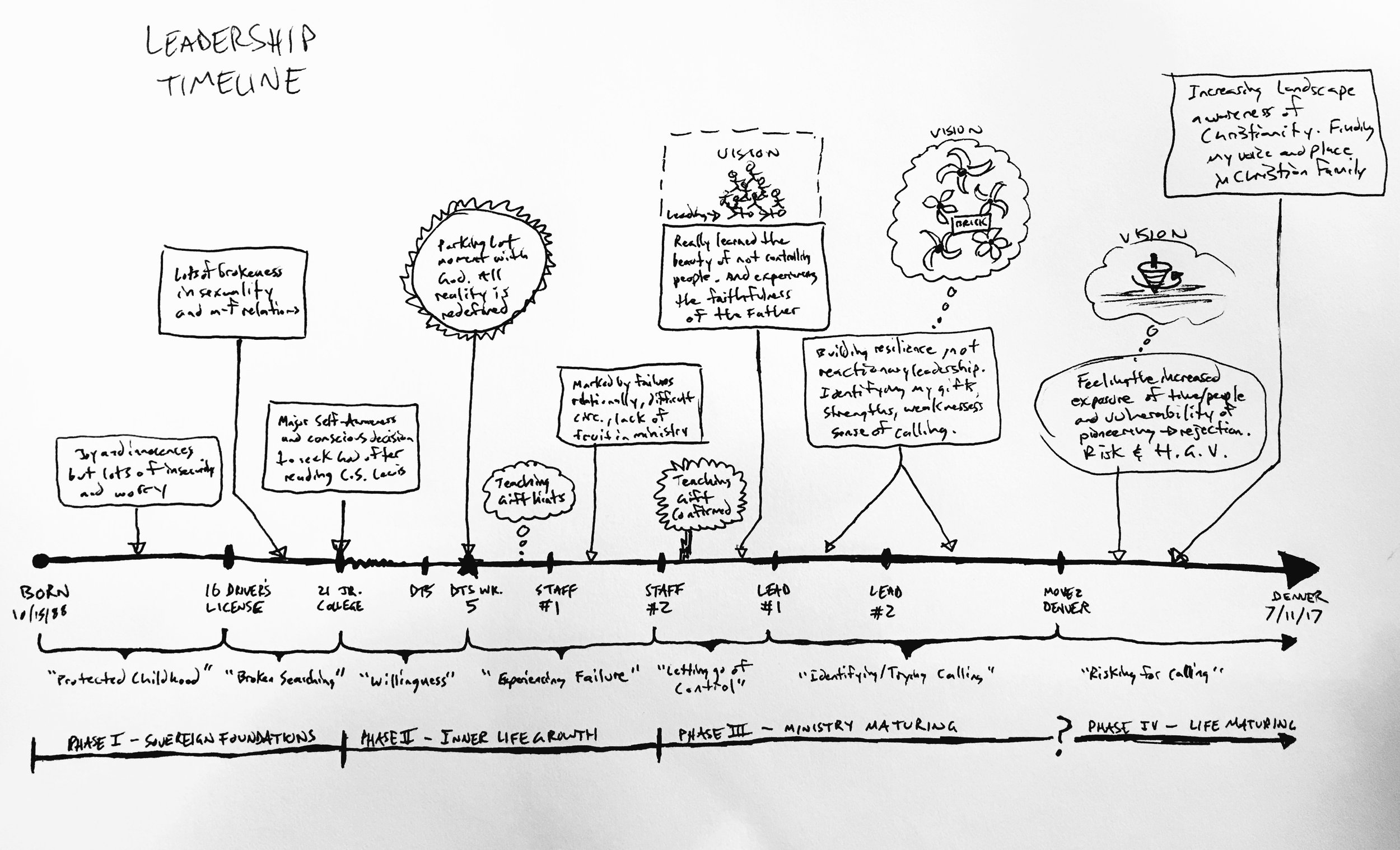201 Cohort - Exploring Leadership Paradigms
The purpose of this cohort is to dive deeper into key leadership paradigms for those who have tried leading something. We have a deep core value for risk-taking and having practical experience in the process of learning. This space will be facilitated dialogue based on weekly homework content around topics like Gospel Identity, Lifelong Learning, Stage of Leadership Development, Relational Expectations, NT Leadership, Presence Paradigm, Healthy Attachments, Missional Identity, and Covenant Community. We hope people will finish the Cohort with (1) a sense of deeper connection with the community and support, (2) growth in theological reflection and awareness, and (3) a sense of discernment if the Lord is calling you lead something again in your next season of discipleship.
Password: “jesus”
Key Paradigm Texts Underlying the 201 Cohort
Primer Homework - Story Timeline
If you have not done the 101 Cohort (or it has been a while) please set aside some time to do this activity.
You will need a pencil and paper
Watch the 10-min video to guide you!
Week 1 - Defining Leadership
I. Introduction Questions:
Why are we running this Leadership Cohort?
What is our definition and invitation for Leadership?
II. Overview of Weeks
III. Dialogue Questions:
Why did you agree to jump into this cohort?
What is an experience you’ve had recently in leadership and what is something you learned about yourself?
What sense of values and/or calling are you carrying in your heart as a leader?
Week 2 - Gospel Identity
Dialogue Questions:
Reflect on the two video teaching about the Parable of the Prodigal Son. What does it stir in you?
What is your goal in following Jesus?
What does this Parable have to do with leadership?
Bonus Teaching: Exploring the concept of Identity, culture, and Gospel Identity by Tim Keller.
Part I - Frameworks for a Life of Leadership
Week 3 - Becoming Lifelong Learners
Dialogue Questions:
What culture is being curated in your community around leadership?
Why might a rhythm of biblical reflection and prayer be key in a leadership team?
Can you describe a time when you were on a team that hit a “Utopian Flaw,” but went through a healthy learning cycle? (Crisis > Questions > Biblical Reflection in Community > Prayerful Discernment > Experimentation > Confidence)
If not, describe a time when you were on a team that failed in a time of crisis and conflict, and what do you think was missing that prevented a healthy process of learning?
If you have been through a Utopian Flaw experience that sent you down the spiral of Doubt > Disappointment > Discouragement > Disillusionment > Despair, please describe where you are now with that experience (Has the Gospel of forgiveness, repentance, letting go of judgments, and being reconciled been applied to these relationships?)
Week 4 - Life Stages of Leadership
Dialogue Questions:
How have you or how are you reconciling your foundation years?
Pause to Reflect and Survey the Stages: What Life Stage might you be in now?
What are you enjoying the most in this season of your development journey?
What are your pain points, tensions, and challenges? What is God trying to teach you at the moment?
Are you walking in openness with some friends, team members, or spiritual parent figures? Do you feel known and seen by them? Do they feel known and seen by you?
So what is the goal of engaging these stages?
Optional Exercise:
Set aside an hour for prayer and reflection
Start by mapping out key moments of leadership small, big, successful, and failures
Pray & ask God to show you what was going on in those moments, what themes do you see?
Attempt to mark in Leadership life phases, now try to really lean into all that stage has for you!
Week 5 - Constellation of Relationships
Dialogue Questions:
Why is confident sonship/daughterhood, or knowing you are the beloved of the Father, essential for engaging in healthy relationships? How does this confidence center us for being vulnerable and emotionally available to others? Why is this a requirement for leaders?
Can you identify by name who you’re upward grace or deep anchor relationships are? Who are they to you? Describe the way you interact with them. Tell of how you think they see you? Who are you to them?
Can you identify by naming your Mentors and Coaches? How do they serve to bring insight, knowledge, and wisdom to your life development?
Can you identify by name the disciples the Father has given you as your in-season assignment? How comfortable are you in affirming Paul’s invitation to his disciples: ”Follow me as I follow Christ?” In what ways are you adopting these dear people into your heart? Who are they to you?
Who are your true blue brothers, your sassy smart sisters, your fun-loving friends, and confident comrades who will go the extra mile with you on your journey? Tell of who they are to you and how they’ve come alongside you in a challenging time of life or partnered with you on a kingdom project, mission, or expedition?
Part II - Discipleship and Leadership as the Church
Week 6 - A Discipleship Paradigm
Dialogue Questions:
What is your definition of Discipleship?
Think about impactful seasons of discipleship in your life, what ingredients were present that led to this season?
Talk about the “how” of discipleship, how are you currently practicing the way of Jesus? What practices, risks, joys, and obstacles are you currently facing?
Homework Questions:
Lord, what parts of my life are good news and worth following?
What parts of my life are not good news and I need you to help me mature?
Who is relationally leaning into my life and how am I being intentional with those relationships?
Week 7 - New Testament Leadership Development
Dialogue Questions:
Do you gravitate towards Movement or Family? What happens if we have one or the other? Why do we need both? Reflect from your own story to illustrate your thoughts.
Take some time to reflect on the 7 Key New Testament Leadership Principles presented. Let’s reflect on each and draw out some personal illustrations from the past and implications for the present:
Leadership is not actually the end goal
Leadership is a modality of servanthood
Leadership should emerge proven and tested
Leadership as both specific and for everyone
Leadership as essential for expansion of the church
Leadership as mutual submission within teams
Leadership as a call to extraordinary focus and devotion
Reflect on the idea, “God is not preparing you for leadership, but using leadership to prepare us for Himself.” What is a risk you could take in this season to embrace God’s process of preparing you for Himself?
We define Church as Prayerful on Mission. Close with any reflections on this definition of “the church” (or from Dave’s video on Church). We explore each of these three key values in the coming three weeks!
Week 8 - Prayerful (Hosting the Presence of Jesus)
Dialogue Questions
What was God highlighting most from Jill Weber’s teaching on the history of Prayer?
What theological foundations did you learn about the place of prayer for leadership?
What historical groups or movements of prayer were new to you?
How would you describe your individual and communal life of prayer? Does this video stir up any changes you want to make in these two areas? Do you feel the Lord challenging or inviting you into any expressions of prayer you learned about?
How does the value of prayer affect your view of leadership, success, and discipleship?
Week 9 - Family (Love Like Jesus)
Dialogue Questions:
What was the most insightful or eye-opening thing you learned from Jim?
Sit in his paradigm of Biblical love as attachment love. What are some implications for leadership as a follower of Jesus?
Can you reflect and identify ways you have seen relational attachment bring transformation in your life or the lives of others?
What could you try changing in the way you lead right now (or in the coming season of leadership)? Start with the twelve keys to attachment Jim mentioned.
What will leading this way cost you? What may you gain?
Week 10 - On Mission (Sent Like Jesus)
Dialogue Questions:
How does Hugh’s story and life example reframe “Leadership” for you?
Hugh talks about “Leveraging all of your life into your one calling.” What does this stir in you as a leader? Do you think about your life this way? Why (or why not) do you think that is?
Hugh’s idea of “evangelism starts with embracing interruptions and then living with intentionality. What do you think of this? How do you apply this idea to your life?
Hugh shared that evangelism started with his Sunday planning sessions of asking God who he should be intensional with for that week? Do we have the courage to put this small routine into our schedules?
What things in your life do you do for fun? How can you invite others into this (aka “Get a Life”)?
Part III - Invitation to Dream, Risk, and Lead
Week 11 - Missional Ecosystem
Dialogue Questions:
What does the Tampa Underground’s story challenge or inspire in your leadership?
What does the story challenge or inspire in your paradigm of a church?
What values do you see mirrored in yourself? What values do you feel compelled to grow into?
What questions does their story stir?
Week 12 - Participation & Practice
To help pull together themes from this cohort and invite participants to actionable next steps we would like everyone to do the Story Lab Activity. This is a simple prayerful reflection exercise that invites you to reflect on your sense of mission, vision, and calling. Listen to the audio to be guided through the exercise. For our purposes try to focus on a missional desire that you could actually pursue in this season of life.
Dialogue Questions:
(1) Mission Questions: What dreams are you carrying in your heart? What evil do you feel called to combat? What bigger purpose do you feel uniquely called to? Or even simpler what is something you enjoy that you could invite others into and center it on Jesus?
(2) Identity Question: What identity statement would you write over Coram Deo as a church community?
Examples
(1) In a world of deconstruction and everyone mistrusting God, I feel called to create spaces of vulnerability, learning, and reconstruction. In hopes that people would rediscover the goodness, faithfulness, and intimacy of relationship with Jesus.
(2) We are a people who embrace failure and risk because, through them, God tenderizes our hearts and matures us to look more like him.
Bonus Teachings
A really insightful interview on leadership and our American Culture with Brian Sanders. Brian was part of the founding team of the Tampa Underground.
A really mind-blowing interview with writer and thinker Andy Crouch. Andy is a luminary voice in the Body of Christ.
Bonus Video: Biblical Theology of a Presence Paradigm from Tim Mackie
Bonus Teaching on “Church” Important if you have not done the 101 Cohort









